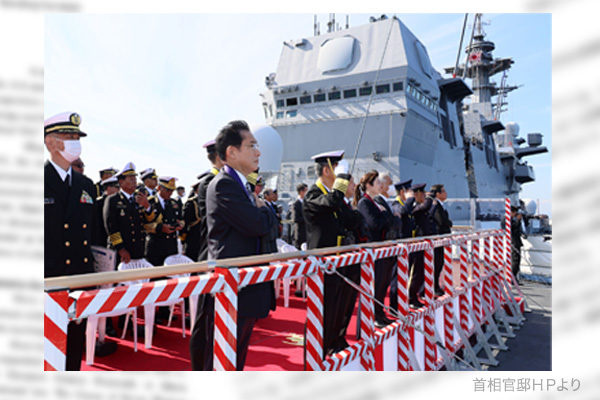Japanese Prime Minister Fumio Kishida appeared on the cover of the May 22-29 issue of Time magazine (Asia edition). The original headline of the online version of the interview article read “Prime Minister Fumio Kishida Is Turning a Once Pacifist Japan Into a Military Power.” Kishida in a later interview with the Chugoku Shimbun newspaper complained that the headline deviated far from the content of the article, leading the Japanese Foreign Ministry to convey the complaint to the magazine. Then, Time magazine replaced the online headline with “Prime Minister Fumio Kishida Is Giving a Once Pacifist Japan a More Assertive Role on the Global Stage.”
Kishida himself may not have used the term “military power” in his interview with Time magazine. But there is no rule that headlines must use wording from within articles. Shouldn’t Kishida say that Japan aims, as a direction, to become a military power while not posing a threat to other countries?
The Time article implies no criticism of Japan
When reading Time magazine’s article, one finds that it does not criticize Japan’s turning into a military power. Citing a northern territory dispute with Russia, North Korea’s repeated firing of ballistic missiles and China’s growing pressure on Taiwan, the article shows understanding for the prime minister’s efforts to “set about turning the world’s No. 3 economy back into a global power with a military presence to match.”
Regarding Kishida’s ideal of nuclear abolition, the article says Kishida has a strong feeling about “a world without nuclear weapons” through his childhood experience.
The word “military power” does not contain any nuance that criticizes militarization. Nevertheless, Kishida may have been concerned about consistency with his repeated pledge that he would not make Japan a military power under its “exclusively defensive” posture.
While being surrounded by Russia, North Korea and China that are all armed with nuclear weapons, Japan cannot become a true military power with sticking to the three non-nuclear principles of not possessing, not producing and not permitting the introduction of nuclear weapons.
Furthermore, Article 9 paragraph 2 of the Constitution that calls for not maintaining “war potential” has not been revised and the Self-Defense Forces, though being an armed organization in charge of national defense, are not like foreign military forces but rather an administrative agency whose missions and authorities remain strictly restricted.
Japan should have stopped avoiding military
Even so, the Kishida government revised three strategy documents including the National Security Strategy last December and set goals of achieving “a new balance in international relations, especially in the Indo-Pacific region” and preventing “the emergence of situations in which any one state can unilaterally change the status quo easily.” To achieve the goals, the government decided to increase defense spending to 2% of gross domestic product (GDP) by fiscal year 2027.
Apart from whether or not to translate “power” as “taikoku (great power)” in Japanese, the word “military power” is not wrong for describing Japan’s goal after the government set out the direction of becoming a nation that gives importance to the military field. Will Kishida be satisfied with the explanation of a military power as a true defense power that disallows foreign aggression?
Takashi Arimoto is a Planning Committee member at the Japan Institute for National Fundamentals and publisher of Monthly Magazine SEIRON at the Sankei Shimbun newspaper.


